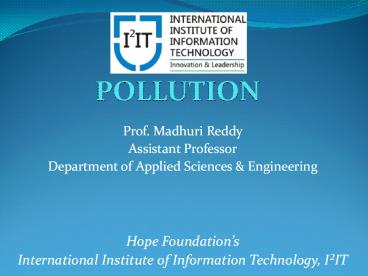What is Pollution - Department of Applied Science and Engineering - PowerPoint PPT Presentation
Title:
What is Pollution - Department of Applied Science and Engineering
Description:
This presentation explains what is pollution and is presented by Prof. Madhuri Reddy, from the department of Applied Science and Engineering at International Institute of Information Technology, I2IT. The presentation begins with definition of pollution and dives into different types of pollution, their causes and effects, and how they can be avoided. – PowerPoint PPT presentation
Number of Views:231
Title: What is Pollution - Department of Applied Science and Engineering
1
POLLUTION
- Prof. Madhuri Reddy
- Assistant Professor
- Department of Applied Sciences Engineering
- Hope Foundations
- International Institute of Information
Technology, I²IT
2
CONTENTS
- Definition of Pollution.
- Air Pollution.
- Water Pollution.
- Noise Pollution.
- Land Pollution.
3
What Is Pollution???
- When harmful substances contaminate the
environment, it is called pollution. - Pollution refers to the very bad condition of
environment in terms of quantity and quality.
4
Types Of Pollution
- Air Pollution
- Water Pollution
- Noise Pollution
- Land Pollution
5
Air Pollution
- Air pollution can be defined as the presence of
toxic chemicals or compounds (including those of
biological origin) in the air, at levels that
pose a health risk. - Air is considered safe when it contains no
harmful dust and gases.
6
Causes of Air Pollution
- Industries.
- Automobiles and Domestic fuels.
- High Proportion of undesirable gases, such as
sulphur dioxide and carbon monoxide. - Dust(e.g. cement dust, foundry dust and wind
blown solid dust) - Mist.
- Smoke.
- Carbon black.
- Aerosols.
7
Effects of Air Pollution
- Health Effects of Air Pollution
- Irritation of eyes
- Irritation of throat and nose
- Wheezing
- Coughing
- Tightness of chest
- Difficulty in breathing
- Heart and lung problems like Asthma
- Enhanced risk of heart attacks
8
Effects of Air Pollution
- Environmental Effects
- Acid rain
- Eutrophication
- Haze
- Effect on wildlife
- Depletion of ozone layer
- Damage to crops
- Damage to forest cover
- Change of global climate
- Green House Effect
9
Air Pollution Control
- Control measures using equipments like
Gravitational settling chamber, Cyclone
separator, Electrostatic precipitators - Selection of suitable fuel. (Low sulphur coal in
power plant, using of CNG) - Destroying the pollutants by thermal or catalytic
combustion. - Changing the pollutants to less toxic form
- By releasing the pollutants through tall chimneys
for greater dispersion. - Prevention By Laws
- Afforestation
10
Water Pollution
- Water Pollution can be defined as alteration in
physical, chemical, or biological characteristics
of water through natural or human activities and
making it unsuitable for its designated use. - Fresh Water present on the earth surface is put
to many uses. It is used for drinking, domestic
and municipal uses, agricultural, irrigation,
industries, navigation, recreation. The used
water becomes contaminated and is called waste
water.
11
Causes of Water Pollution
- Major sources water pollution ......
- Municipal Waste
- Water Industrial Waste
- Inorganic Pollutants
- Organic Pollutants
- Agricultural Wastes
- Marine Pollution
- Thermal pollution
12
How to Avoid Water Pollution
- Rivers should not be used for washing clothes or
bathing animals - Harvesting of Rainwater to meet water
requirements. - Dams embankments must be created.
- The rivers must not be contaminated.
- Industrial waste water treatment before letting
them into water bodies
13
Noise Pollution
- Noise can be simply defined as unwanted sound.
- Sound or Noise pollution is defined as the
unwanted sound dumped into the atmosphere that
leads to health hazardous.
14
Causes Of Noise Pollution
- Transportation system is the main cause in urban
areas. - Construction of the buildings, highways, due to
the usage of air compressors, bulldozers,
loaders, dump trucks. - Industrial noise.
- Loud speakers, plumbing, boilers, generators are
the existing noise pollution. - Social events are also a major causes of sound
pollution.
15
Effects Of Noise Pollution
- High blood pressure, stress related illness,
sleep distribution, hearing loss, etc. - It can also effects on memory loss.
- Noise can effects serious damage to wild
animals. - The production capacity and growth of plant is
affected due to high level noise.
16
Control Of Noise Pollution
- Planting trees.
- Regular service and tuning automobiles.
- Using sound proof walls, windows, ceilings.
- Using ear plugs and ear muffs.
- Control noise at source by proper choice of
equipment, design modification, mounting and
proper layout. - Isolation or use of baffles.
17
Land Pollution
- Land pollution may be understood as the
deterioration of the earths land surfaces, often
directly or indirectly as a result of mans
activities - Causes
- DEGENERATIVE ACTIONS
- Deforestation, overuse of pesticides and
chemical fertilizers, desertification, mining,
inefficient and / or inadequate waste treatment,
landfill, litter, etc.
18
Effects of land pollution
- Effects On Climate - Land pollutions leads to
loss in the forest cover of Earth. - Extinction Of Species - Species are pushed
towards endangerment and extinction primarily by
two processes. - Bio Magnification - Process in which certain
non-biodegradable substances go on accumulating
in the food-chain - Effects On Biodiversity -Species extinction and
bio magnification lead to overthrow of the
balance of nature very significantly.
19
How to Prevent land pollution
- Reduce toxic materials -waste materials that are
disposed of should have minimal toxic materials. - Recycle waste materials so that less land is used
for landfill - Use organics products, especially organic
cleaners, pesticides, insecticides and
fertilizers. - Grow more trees so that the fertility of the soil
increases - Proper waste management
20
Thank You
For further details, please contact Madhuri
Reddy madhurir_at_isquareit.edu.in Department of
Applied Sciences Engineering Hope
Foundations International Institute of
Information Technology, I²IT P-14,Rajiv Gandhi
Infotech Park MIDC Phase 1, Hinjawadi, Pune
411057 Tel - 91 20 22933441/2/3 www.isquareit.edu
.in info_at_isquareit.edu.in































